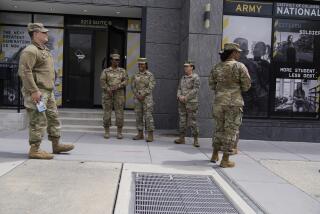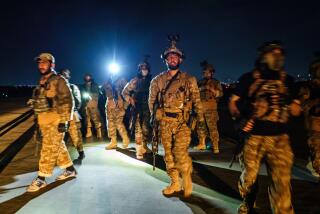Afghanistan in 2015
- Share via
Almost two years remain before a NATO-led international military force in Afghanistan is supposed to turn over full security responsibility to the Afghan military. But the Obama administration and its critics are already sparring over the size of the residual U.S. presence that will stay on after 2014.
The administration indicates that it will amount to only a few thousand troops — some officials have even floated the notion that none would remain after 2014 — while its critics, including Republicans in Congress, have insisted that at least 10,000 and perhaps three times that number will be necessary to prevent Afghanistan from backsliding into instability.
We don’t presume to know the precise number of troops that will be necessary in 2015 to ensure that Al Qaeda and associated groups can’t use Afghan territory to launch further attacks on Americans, the rationale for the U.S. invasion after 9/11. But The Times’ David S. Cloud and Alexandra Zavis report that the administration believes it could meet that objective with a “light footprint” strategy — similar to the one it has pursued in Pakistan — emphasizing commando raids and drone missile strikes against Al Qaeda fighters.
Both the president and advocates of a large residual force insist that Afghan forces are improving their effectiveness. Ideally that process will continue so that in 2015, the Afghan army can competently prosecute the war against Taliban insurgents without significant support from the U.S. military. Meanwhile, it is to be hoped, the Afghan government will root out the corruption that has undermined its authority.
But if that doesn’t occur, as many believe it will not, and the U.S. is still able to mount an effective counter-terrorism effort without many boots on the ground, the light footprint strategy should be implemented. A large residual force might be justifiable if it functioned effectively as a deterrent, as the 28,000 U.S. forces in South Korea do. But U.S. troops in Afghanistan are daily in harm’s way. As Obama pointed out in his weekend address, more than 2,000 Americans have given their lives in Afghanistan. More will die this year and next, even if the administration accelerates its withdrawal.
When it invaded Afghanistan in 2011 to overthrow the Taliban regime that had harbored Osama bin Laden, the United States — perhaps unintentionally — assumed a moral obligation to assist that country in its political and economic reconstruction. It is discharging that responsibility and will continue to do so even after Afghans take complete charge of their security. But as Obama also said Saturday, “after more than a decade of war, the nation we need to rebuild is our own.”
More to Read
A cure for the common opinion
Get thought-provoking perspectives with our weekly newsletter.
You may occasionally receive promotional content from the Los Angeles Times.










